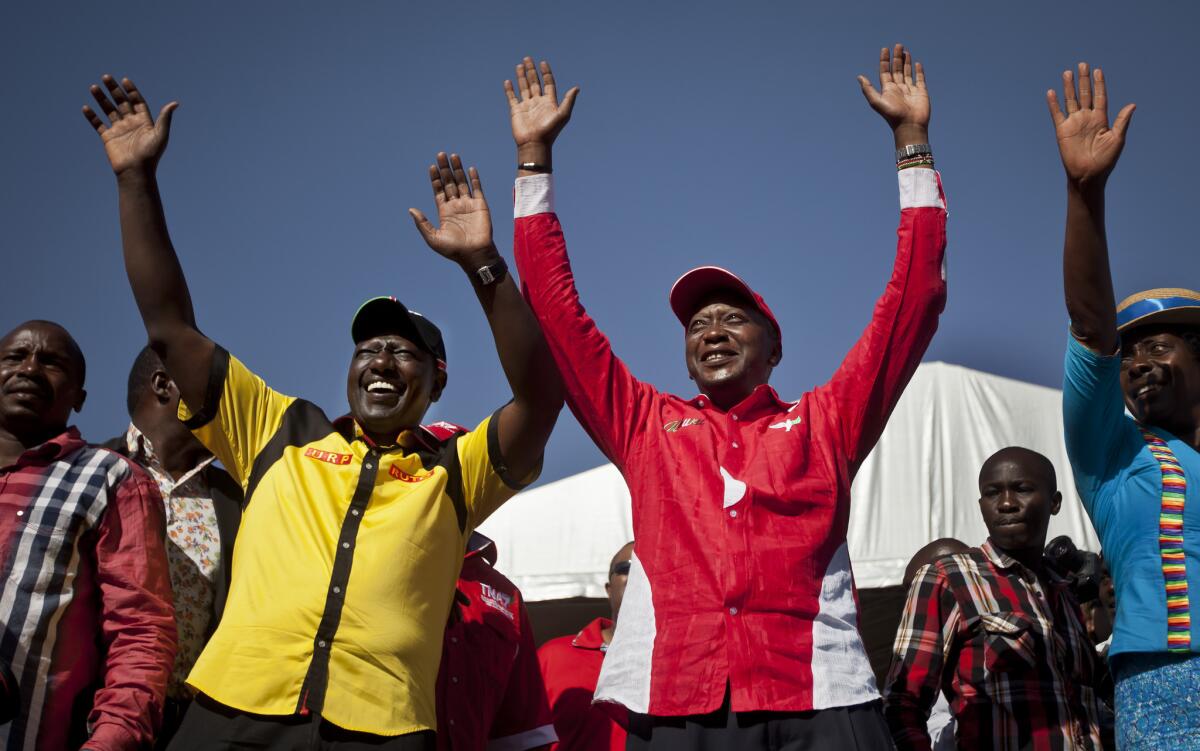African Union official attacks ‘condescending’ International Criminal Court

- Share via
JOHANNESBURG, South Africa -- A top African Union official said the International Criminal Court was a “political instrument” with a condescending approach to Africa, as African leaders gathered in the Ethiopian capital, Addis Ababa, to discuss the court.
The extraordinary meeting to talk about the court’s relationship with Africa comes with Kenya’s president and vice president facing trial for crimes against humanity at the ICC in the Hague. Some East African officials are reportedly pressing for a mass withdrawal from the ICC.
Ethiopia, Kenya, Sudan and Uganda have been deeply critical of the ICC, accusing it of bias.
Ethiopian Foreign Minister and the chair of the AU executive council, Tedros Adhanom Ghebreyesus, said Friday at the AU meeting opening session that African leaders should no longer tolerate the court’s attitude toward Africa.
“We should not allow the ICC to continue to treat Africa and Africans in a condescending manner. Far from promoting justice and reconciliation, and contributing to the advancement of peace and stability in our continent, the court has transformed itself into a political instrument targeting Africa and Africans,” Ghebreyesus said, before the ministers went into a closed session.
The first ICC trial of a sitting leader, Kenyan deputy president William Ruto, has placed the court under unprecedented political pressure, with Kenya rallying opposition against the court.
The prosecutions of Kenyan president Uhuru Kenyatta and of Ruto were instigated by the U.N. Security Council after Kenyan authorities failed for years to take steps to bring to justice those responsible for violence following the nation’s disputed 2007 election.
Both men deny committing crimes and promised before their March election to cooperate with the ICC. Since then they have repeatedly called for the cases to be thrown out, while Kenya has pressed the U.N. for the cases to be dropped.
Ruto is currently being tried; Kenyatta’s trial is due to begin next month.
In a sign of its willingness to leave trials for heinous crimes to those African countries willing to mount such prosecutions, the court Friday announced that former Libyan intelligence chief Abdullah Al-Senussi would not be tried at the ICC, since Libyan authorities were genuinely willing and able to prosecute him.
He was indicted by the court in 2011 for crimes committed during the rebellion against the government of Moammar Kadafi. Al-Senussi was Kadafi’s brother-in-law and a close and trusted advisor.
The decision that the post-Kadafi Libyan government had the capacity to try Al-Senussi could be overturned on the appeal of the prosecutor or defense, if it turned out that proceedings in Libya weren’t fair, the ICC said in a statement Friday.
Some African leaders have become critical of the ICC, accusing it of bias because of its many cases involving Africans. Of those, only a few were instigated by the court. About half were referred to the court by African governments, including Uganda, while others were referred to it by the U.N. Security Council.
Adding to the tension is the fact that nations like the United States, China, Russia and Israel have refused to submit to the court.
Kenya’s parliament has already voted for a resolution that the country withdraw from the ICC next year.
Of the 122 signatories to the Rome Statute that set up the court in 2002, 34 are Africans. If African countries abandoned the court en masse, it would be catastrophic for the court, analysts say.
Former U.N. Secretary General Kofi Annan said Monday that it would be a badge of shame for any African leader who withdrew from the court. He said the court was a last resort when domestic justice failed.
ALSO:
Kerry was initially skeptical of U.N. chemical team in Syria
Whimsical project puts Athens’ Pittaki Street in a better light
OPCW wins Nobel Peace Prize; group struggling to disarm Syria
Twitter: @latimesdixon
More to Read
Sign up for Essential California
The most important California stories and recommendations in your inbox every morning.
You may occasionally receive promotional content from the Los Angeles Times.









